
Introduction to White Hat Link Building for Affiliate Sites
Backlinks are the fuel that powers your affiliate site’s visibility in search engines. If you’re serious about affiliate marketing, building white hat backlinks for affiliate sites isn’t optional—it’s necessary.
But let’s be real. You’re not here to game Google. You’re here to play smart, build authority, and earn rankings that stick. That’s exactly what white hat link building is about.
Why Backlinks Matter in Affiliate Marketing
Search engines see backlinks as votes of confidence. The more quality sites link to you, the more trustworthy your content appears. And for affiliate marketers, this means more organic traffic, more clicks, and ultimately, more commissions.
What Does “White Hat” Really Mean?
“White hat” simply means you’re playing by the rules. No shady tactics. No spammy link farms. Just genuine strategies that deliver long-term results without putting your site at risk of penalties.
Setting a Strong Foundation Before Building Links
Before you start reaching out for backlinks, your site needs to be link-worthy. Otherwise, all the effort you put into link building won’t stick.
On-Page SEO Must-Haves
Fix your titles, meta descriptions, internal linking, and URL structures. If your site isn’t optimized internally, external links won’t be nearly as effective.
Content Quality as a Prerequisite for Link Building
Content is the hook. If it’s not useful, unique, or engaging, nobody’s going to link to it. Focus on creating value-packed blog posts, tutorials, and reviews that others naturally want to reference.
Choosing the Right Affiliate Niche and Keywords
If you’re in a hyper-competitive niche like credit cards or insurance, link building is harder. Niche down and target long-tail, low-competition keywords to get traction faster.
Content-Driven Link Building Strategies
This is where your content becomes a magnet for links—organically and through outreach.
Creating Linkable Assets
Want backlinks to come naturally? Create resources people want to link to.
Ultimate Guides
Long-form, well-structured guides (like this one) often attract links because they’re comprehensive and useful.
Case Studies and Data Reports
If you’ve run an experiment or collected original data, package it into a case study or report. These are gold for attracting backlinks from journalists, bloggers, and niche experts.
Infographics and Visual Content
A solid infographic shared with relevant bloggers and communities can pull in tons of natural links. Just make sure it’s well-designed and packed with value.
Guest Posting on Niche-Relevant Blogs
Yes, guest posting still works. But forget generic submissions. You need to target blogs in your niche and offer tailored, well-researched content.
How to Find Guest Posting Opportunities
Use Google search operators like:
“your niche” + “write for us”
“your topic” + “guest post guidelines”
Also, spy on your competitors’ backlinks using tools like Ahrefs or Semrush.
Writing Value-Packed Guest Posts
Don’t treat guest posts as dumping grounds for backlinks. Make them better than your own blog content. Include examples, visuals, and solid takeaways.
Link Roundups and Resource Page Inclusions
Find weekly or monthly link roundups in your niche and pitch your best content. Likewise, search for resource pages where your content could be a helpful addition.
Outreach-Based Link Building Tactics
If content is the magnet, outreach is the string that pulls people to it.
Email Outreach with a Personal Touch
Stop sending mass emails. Personalize your outreach. Mention their work. Show how your content adds value to their page. Respect their time.
Broken Link Building (Ethical Approach)
Find broken links on blogs in your niche and suggest your relevant content as a replacement. You’re helping them fix an issue while getting a backlink—win-win.
The Skyscraper Technique for Affiliate Sites
Find high-performing content with lots of backlinks. Make something even better. Then, reach out to everyone linking to the original and show them your version.
Leveraging Relationships and Communities
Sometimes the best backlinks come from real connections, not cold emails.
Collaborating with Other Bloggers in Your Niche
Cross-promote. Co-create content. Interview each other. Real collaboration often leads to high-quality backlinks and ongoing partnerships.
Engaging in Relevant Forums and Q&A Sites
Places like Reddit, Quora, and niche-specific forums are great for driving traffic and picking up backlinks—if you’re genuinely helpful and not spammy.
Participating in Podcasts, Webinars, and Interviews
Podcasts and webinars often link to your site in their show notes or guest bios. Plus, they’re great for building your personal brand.
Tools and Automation for Smarter Link Building
You don’t have to do everything manually. A few smart tools can supercharge your efforts.
Best Tools for Link Prospecting
- Ahrefs: Uncover competitor backlinks and link prospects.
- BuzzSumo: Find trending content and influencers.
- Hunter.io: Grab email addresses for outreach.
- NinjaOutreach: Manage influencer outreach campaigns.
Tracking and Managing Your Outreach Campaigns
Use tools like Pitchbox, Mailshake, or even Google Sheets to track who you’ve emailed, who responded, and what content you’ve pitched.
Common Mistakes to Avoid in White Hat Link Building
Even the best strategies can flop if you make avoidable mistakes.
Buying Links or Participating in Link Schemes
Tempting? Maybe. Smart? Never. Google’s penalties are brutal. Stick to white hat.
Over-Optimizing Anchor Texts
If all your backlinks say “best keto supplements,” you’re asking for trouble. Mix it up with branded, generic, and long-tail anchors.
Ignoring Nofollow vs. Dofollow Links
While nofollow links still have value, your main goal should be earning dofollow links from high-authority domains.
Measuring the Success of Your Link Building Efforts
If you’re not tracking results, you’re just shooting in the dark.
Monitoring Backlink Growth
Use tools like Ahrefs, SEMrush, or Google Search Console to monitor new links, lost links, and link quality.
Impact on Affiliate Rankings and Conversions
Backlinks should improve your rankings, but the end goal is conversions. Monitor which backlinks drive traffic and which pages earn affiliate income.
Conclusion
White hat link building for affiliate sites isn’t fast. It’s not easy. But it’s worth it. When you focus on creating amazing content, building real relationships, and using smart outreach strategies, you’ll earn links that boost your rankings, build trust, and make affiliate sales.
No shortcuts. No shady tactics. Just results that stick around.
FAQs
How long does it take to see results from white hat link building?
Typically, 3–6 months depending on your niche, content quality, and link acquisition rate.
Can I build backlinks without creating new content?
Yes, through strategies like broken link building and guest posting—but great content makes everything easier.
How many backlinks does an affiliate site need?
There’s no magic number. Focus on quality over quantity. A handful of links from authority sites can outperform hundreds of low-quality ones.
Are forum links still effective in 2025?
Yes, if used naturally in niche-specific forums where you’re genuinely contributing value.
What anchor text strategy works best for affiliate SEO?
Use a mix: branded, naked URLs, partial match, and generic (like “click here”). Avoid over-optimization.
Read More:

